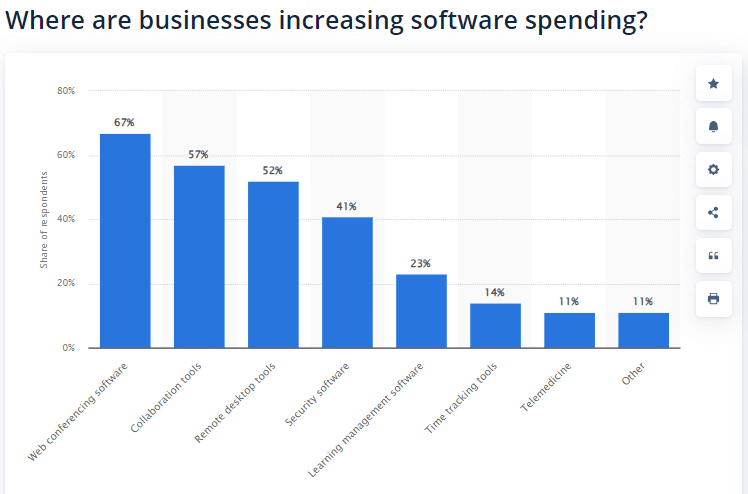Project management stands as the pivotal element that binds all business operations, acting as the driver for project success. Keeping up with current project management trends is crucial in ensuring projects seamlessly meet their deadlines, budgets, and quality standards expected by your clients.
Amidst a sea of information dispersed across various reports and websites, finding pertinent insights to drive up project success rates can often be daunting. To counter this hurdle, Business2Commiunity has scrupulously navigated through the clamor, curated, and assembled a list of emerging project management trends for 2025.
Key Project Management Trends
- In 2022, the adoption of agile methodologies stood at 36% for product or application owners and 32% for engineering or R&D teams.
- The adoption of AI is expected to result in an 80% reduction in the existing workload related to project management by 2030.
- The project management software market is anticipated to reach $6.68 billion by 2026.
- In 2020, 51% of organizations required some type of certification for the role of project manager.
- 71% of organizations in 2022 had established at least one project management office (PMO).
What Are 2025’s Project Management Trends?
In an increasingly complex business landscape, effective project management has never been so critical. According to PMI’s Pulse of the Profession 2020, companies that undervalued project management reported 67% more failed projects. The same source revealed that an average of 11.4% of investment was wasted due to poor project performance.
69% of project professionals noted that their senior leadership placed high value on project management, highlighting a growing acknowledgment among senior executives regarding the necessity for adept project leaders. Additionally, 46% of organizations prioritized fostering a culture that values project management.
To maintain a competitive edge and adapt to an ever-evolving environment, businesses can identify and understand the latest project management trends. The importance of keeping up-to-date with 2025‘s emerging project management trends below cannot be overstated for those seeking success in the current business climate.
1. Agile Methodologies Are Still Most Popular
Agile methodologies have become the gold standard for managing projects, particularly in software development. Agile emphasizes flexibility, collaboration, and customer satisfaction.
According to a 2023 report by Digital.ai surveying software developers, 79% of IT departments and 68% of the software development and delivery lifecycle teams have adopted agile. Businesses adopting agile methodologies have experienced increased project control, improved project predictability, and enhanced team building.
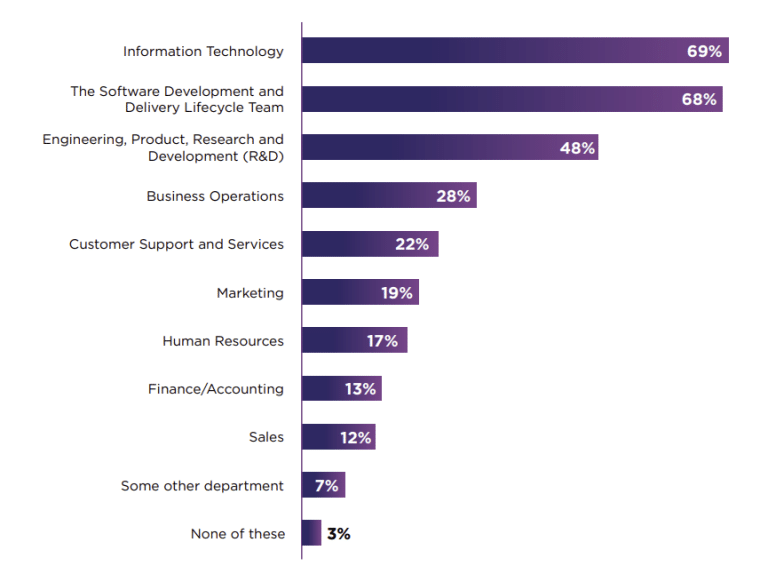
In the previous year’s report from the same organization, High-performing agile teams prioritized people-centric approaches with strong leadership support, culture, and tools (89%). Agile teams focus on developing strong interpersonal relationships, fostering a supportive and collaborative culture, and employing effective tools, with these elements being backed by committed leadership.
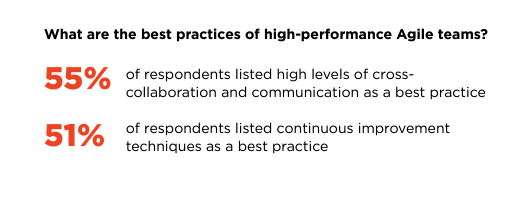
Nearly 4 in 10 respondents to the 2022 report cited a lack of leadership support as a barrier to agile adoption and delivery. A lack of leadership support, reflected in inadequate resources, resistance to change, or absence of strategic vision, can significantly hinder the adoption and efficacy of agile methodologies.
Top priorities for agile practices implementation included:
- Accelerating time to market (52%)
- Delivery predictability (44%)
- Lower risk (31%)
Team members who were happy with agile reported benefits in 2023 like improved collaboration (59%), better alignment with business needs (57%), an enhanced work environment (36%), and greater visibility (21%). Agile encourages teamwork across different functions, removes barriers, and speeds up the sharing of knowledge, which are all essential for driving innovation and staying competitive in today’s fast-moving business world.
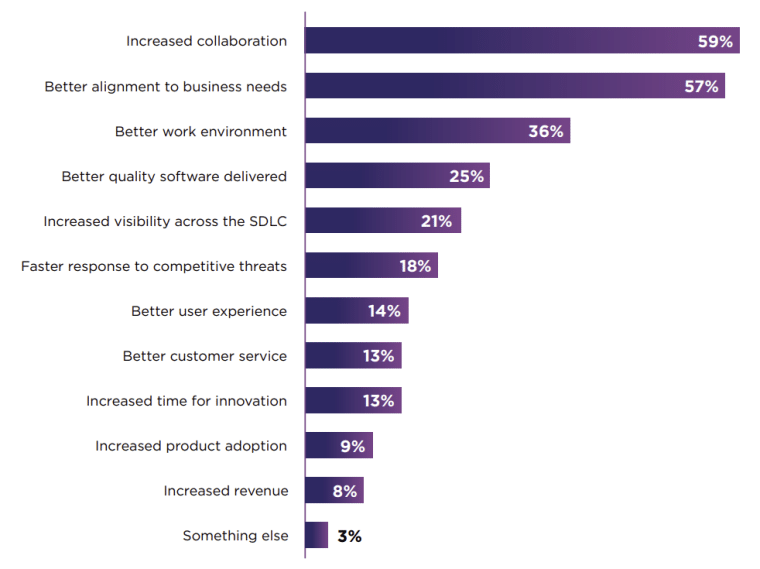
In 2022, Scrum was the leading agile tool (87%), followed by Kanban (56%) and Scaled Agile Framework (SAFe) (53%). The dominance of Scrum as the leading agile tool signifies its effectiveness in managing projects.
50% of team members reported using a combination of agile, waterfall, and/or iterative methodologies, with 27% finding this combination challenging. This difficulty could stem from the complexities involved in integrating diverse project management frameworks, each with its own unique processes, principles, and workflows, into a streamlined, functioning system.
40% of respondents dissatisfied with agile at their organization cited a clash with company culture as the leading cause. This means there may need to be a cultural shift towards radical transparency, frequent communication, and flexibility which are prerequisites for agile project management.
2. Artificial Intelligence Use is Growing in Project Management
According to a forecast by the International Data Corporation, worldwide spending on artificial intelligence (AI) systems is predicted to hit $500 billion by 2027. The adoption of AI in project management specifically can automate repetitive tasks, freeing up time for project managers to focus on strategic decision-making. Furthermore, AI can aid in risk management, resource scheduling, and operational efficiency.
In 2019, Gartner forecasted that by 2030, the adoption of AI will lead to an 80% reduction in the existing workload related to project management. This shift entails AI taking on conventional project management responsibilities such as data collection, tracking, and reporting.
93% of marketing leaders agreed that using low- and no-code AI-powered predictive modeling tools would enable data scientists to address more intricate challenges, facilitating the automation of predictive insights, which can also be applied to project management more broadly. By providing insights into potential issues, AI enables project managers to take preventative measures, thereby minimizing the impact of risks on the project.
A Nielsen Norman Group study in July 2023 found that generative AI tools, such as ChatGPT, increased employee productivity by 66%. With AI-based automation capabilities, tasks are completed more efficiently, allowing project managers to optimize resource allocation.
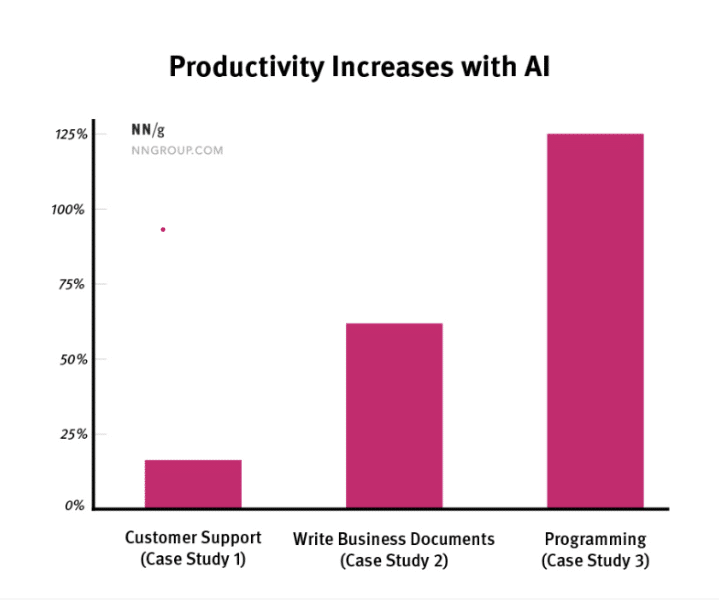
According to a 2022 survey by Gartner, 80% of executives believed automation applies to any business decision. This confidence in automation offers project managers an opportunity to integrate AI into decision-making processes for enhanced efficiency throughout projects.
The same study showed that one-third of organizations have strategically applied AI across business units. The shift toward holistic AI integration indicates recognition of its broader impact, prompting project managers to explore AI applications beyond specific tasks, leveraging data-driven insights and optimizing resources.
54% of AI projects had moved from pilot to production. While a modest improvement from 2019 (53%), this success rate emphasizes that project managers need to strategically plan for operational integration, learn from transitions, and refine approaches for future implementations.
3. Project Management Software is Growing
According to Grand View Research, the project management software market stood at $6.59 billion in 2022 and will grow at a CAGR of 11.7% through 2030. More complex projects are calling for increased use of project management tools, which enable progress tracking, improve communications, and simplify resource and task management.
Wellingtone’s State of Project Management report from 2020 revealed that 23% of respondents employed project portfolio management (PPM) or resource management software. Project managers adopt such solutions to enhance project planning, resource allocation, and overall project portfolio management.
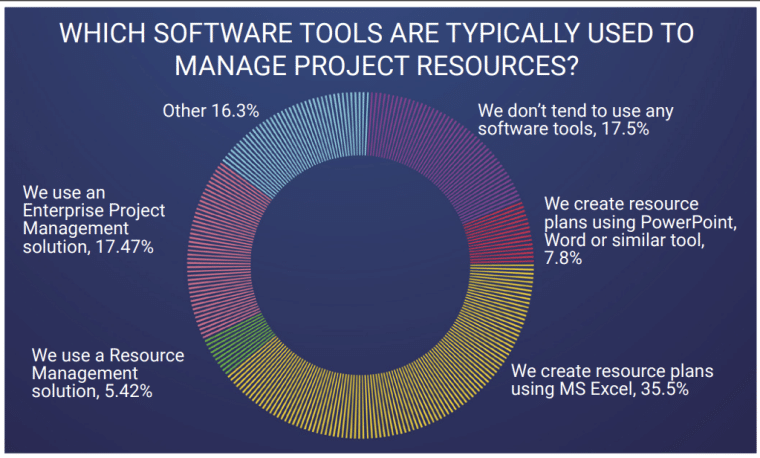
54% of organizations lacked access to real-time KPIs for monitoring project progress, noted the same report. Meanwhile, 38.6% of organizations perceived their current technology for project management as effective.
Microsoft Project (59.04%) was reported as the primary tool for managing project timelines. Other teams reported using Excel (16.9%) or PowerPoint and Word (9.6%). Some teams reported using other planning tools (12.6%) or not using software project management tools at all for managing project plans (1.8%).
A 2022 study reported by Statista revealed that 52% of organizations had increased their use of software collaboration tools during the COVID-19 pandemic. Additionally, there were reported increases in spending on web conferencing software (67%) and desktop tools (52%).
These increases can be attributed to the rapid shift towards remote working, necessitating the use of digital project management tools that allow team members to collaborate effectively, irrespective of their geographical location.
Project managers can explore innovative collaboration tools to streamline communication, enhance information sharing, ensure successful project completion, and foster more efficient teamwork on successful projects.
4. Project Management Training and Skills Development Deepens Your Bench
There’s a growing recognition of the need for specialized training in project management skills. In 2020, 51% of organizations expected project managers to have some kind of certification, noted the PMI report we looked at earlier. Certifications like PRINCE2, Agile, and Scrum are increasingly in demand.
Organizations dedicate resources to training project managers, with 61% having offered various forms of project management training. 47% of these companies have taken additional steps to create a well-defined trajectory for the advancement of project management careers.
The globally recognized Project Management Professional (PMP) certification had a membership of 1.255 million certificate holders worldwide as of 2022. PRINCE2, particularly favored in the UK and Europe, achieved a milestone of over one million certified individuals globally by the end of 2021.
In 2021, the total number of project management degrees awarded in the US was 4,237. The states with the most significant concentration of awarded degrees included Arizona, Colorado, and Minneapolis.
With the Bureau of Labor Statistics expecting more than 68,000 project management job openings per year in the decade up to 2023, it’s vital that organizations upskill and retain their current employees.
5. Key Performance Indicators Set Up Projects for Success
Key performance indicators (KPIs) help businesses and team members steer projects towards success. These indicators not only quantify project accomplishments but also play a vital role in aligning endeavors with overarching strategic goals.
Financial performance and user-centric analytics take center stage in guiding project success. In a 2022 survey including marketing managers, directors, VPs, and CMOs across 35 countries, 88% of participants identified revenue tracking as a primary KPI for their businesses. Customer satisfaction metrics and web/mobile data analytics shared the second position, with each being cited by 87% of respondents.
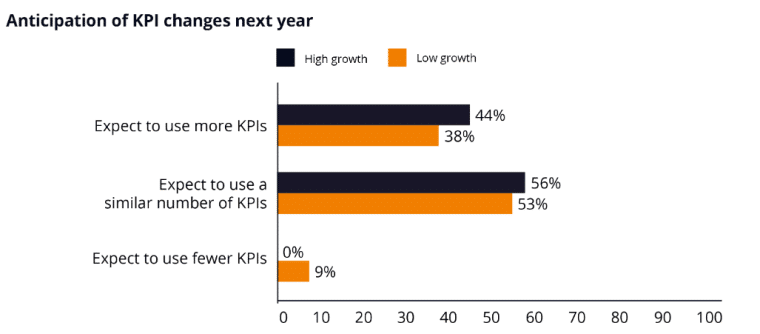
In the “Top 10 Percent” report by PMI and PwC from 2020, 79% of project managers in organizations using technology for KPIs found it easy to gauge project impacts, contrasting with 63% of organizations not using technology. Organizations that leverage technology for KPI tracking can gain a competitive edge, by facilitating a clear, data-driven understanding of project outcomes.
In 2020, 41% of PMOs consistently measured and reviewed their KPIs, with over half regularly communicating project milestones and impacts to the C-suite. These aspects play a role in enhancing PMO maturity, emphasizing the necessity of monitoring KPIs for evaluating project performance.
6. Use of Project Management Offices (PMOs) is Increasing
PMOs play a crucial role in standardizing project management practices and improving overall project performance across an organization. In 2022, 71% of organizations had established at least one project management office (PMO), while half of them had implemented multiple PMOs according to the PMI.
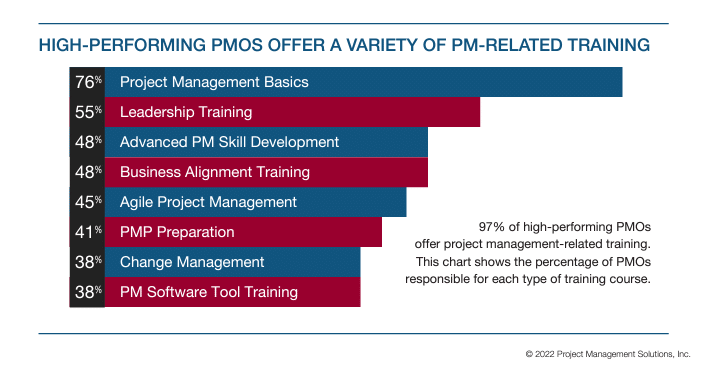
PMOs have evolved into strategic partners within many organizations, with 82% of offices reporting to a VP or higher, and 50% directly reporting to the C-suite. Meanwhile, Over 40% of organizations reported adopting an enterprise/strategic service span for their PMOs.
This shift signifies the recognition of the PMO’s pivotal role in aligning project management with overarching business objectives.
The median age of PMOs is 5 years, suggesting a mix of established and newer PMOs. PMOs vary widely in age, size, and capabilities, impacting their performance. Notably, business unit PMOs are more prone to underperformance, emphasizing the need for tailored strategies to enhance their effectiveness.
PMO operating costs average an annual budget of $500K. The average budget for projects under a PMO totals $15 million, which is roughly a 3% average operating cost. When PM Solutions compared this to data from the previous decade, that percentage remained stable, making it a strong trend in project management.
Meanwhile, high-performing PMOs possessed larger yearly budgets, around $1.4M, compared to their low-performing counterparts who averaged around $400K. This financial advantage enables high-performing PMOs to deliver a marked increase in value by successfully completing projects within budget at a 77% rate, as opposed to the 36% rate managed by the underperforming PMOs.
The use of PMOs is expanding and their value is consistently being demonstrated. As the use of projects and project budgets grow in a business, the use of a PMO can increase your project success metrics.
How to Find Project Management Trends
In the dynamic world of project management, traditional project management methods are being supplemented by new and innovative trends. Here are three key ways to stay updated and learn more about other project management trends:
Follow Influential Project Managers on Social Media
Following authoritative voices in project management on platforms like LinkedIn or X, formerly known as Twitter, can keep you in the industry loop. Expert project managers often share their insights, experiences, and predictions about the industry’s future.

For example, Elizabeth Harrin is a seasoned project manager and author, and Susanne Madsen is a project leadership coach. These professionals frequently post about the latest methodologies, technologies, and best practices in project management.
Several industry experts and project managers share their insights and experiences on YouTube. Channels like Project Management Institute provide educational content and discuss the latest trends in the project management industry.
Listen to Insightful Project Management Podcasts
Podcasts are an excellent source of information, providing in-depth discussions on project management topics and tools. Here are some of the most popular podcasts in project management:
- The PM Podcast: Hosted by Cornelius Fichtner, a seasoned project manager and PMP trainer, this podcast features interviews with industry experts, discussing topics like agile methodologies, leadership, and career development.
- Projectified with PMI: This podcast, by the Project Management Institute, discusses emerging project management trends and challenges faced by professionals in various industries.
- People and Projects Podcast: Hosted by Andy Kaufman, this podcast features interviews with project managers and executives, discussing their experiences, insights, and lessons learned.
Subscribe to Industry Newsletters and Reports
Regularly checking newsletters and reports from industry influencers and organizations helps you stay on-trend. They provide valuable information on the latest technologies and project management methodologies.
Subscriptions to resources like Project Times can provide invaluable insights into the current trends in project management.

The Future of Project Management
Looking ahead, the future of project management is expected to be shaped by continuous advancements in technology and a greater focus on strategic alignment with business goals. We anticipate three key developments that project management professionals should keep an eye on.
Firstly, AI and machine learning will play an increasingly pivotal role in project management. These technologies will facilitate predictive analysis, improving risk management and decision-making, and enabling more efficient resource use.
Secondly, the concept of remote project management will continue to evolve, influenced by the lessons learned during the COVID-19 pandemic. Hybrid work models, combining remote and in-office work, are already the new norm, necessitating adaptable project management strategies.
Lastly, there will be a greater emphasis on sustainability in project management. As businesses increasingly prioritize sustainability goals, project managers will need to incorporate these objectives into their project strategies, with a focus on minimizing environmental impact and promoting social responsibility.
